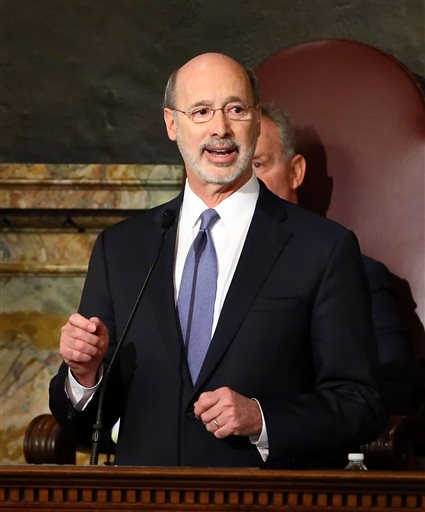Is Pennsylvania Running Out of Money?

Gov. Tom Wolf, delivers his budget address for the 2016-17 fiscal year to a joint session of the Pennsylvania House and Senate at the State Capitol in Harrisburg Pa., Tuesday, Feb. 9, 2016. (AP Photo/Chris Knight)
For the past several months, the Pennsylvania government has been in limbo. The Republican-controlled legislature and Democratic Governor Tom Wolf have been unable to find a way to fund the balanced budget that was previously created for the state several months ago. The $32 billion budget was passed in late June, but since then there has been a stalemate over how to fund it. With an already existent $2 billion deficit from the last fiscal year, the Pennsylvania government has missed payments for the first time in the state’s history. As payments continue to stall and the state continues to borrow money, there may be long-lasting effects on the Commonwealth.
Since this gridlock began, Pennsylvania was downgraded by the credit rating agency Standard and Poor’s. S&P gave the reasoning for the downgrade as being caused by Pennsylvania’s history of creating budgets at a later time than other states and relying too heavily on quick cash infusions and tax collection to pay for the budgets. The lower rating means that it will cost more when the state borrows money due to higher interest rates. Pennsylvania is now in the bottom five ranked states by the credit agency. In response to the low rating, the House Democrats blamed the Republicans for forcing the downgrade by not raising taxes, and the Republicans blamed state fiscal officers and the rating agency itself.
Democrats and Republicans within the state legislature have been unable to agree on a legislative method to finance the plan and move the budget forward. Last week, Governor Wolf met with other legislative leaders to create a revenue bill that would fund the budget based on borrowing, an expansion of gambling, and new, increased taxes. The Republicans created two of their own plans for funding the budget, but they were unable to gain the votes to pass either one. These plans included extending the sales and use tax to storage facilities and warehouses, and imposing a new 5% tax on hotel stays. On Wednesday, Governor Wolf announced he would be unilaterally borrowing against future from the Pennsylvania Liquor Control Board, as a means to begin to pay off the previous deficit. Speaking at a press conference about this decision Wolf said:
“I’m going to manage the finances of the Commonwealth until the House sees fit to do what it’s supposed to do… the basic things that we committed ourselves to in June – protecting education at all levels, protecting seniors… doing what we need to to keep Pennsylvania in the forefront of fighting the opioid epidemic – I’m going to continue to do everything in my power to address those issues.”
In response to Wolf’s statement, House Majority Leader Dave Reed (R-Indiana County) said that the Republicans had been willing to agree on several measures that did not affect taxes and would only focus on gambling expansion and state liquor reforms. Last month, for the first time in Pennsylvania’s history, Wolf delayed making more than $1.7 billion in payments due to a lack of money in the general fund. These payments were mostly going to fund Medicaid insurers and school districts. Legislators have become concerned that state-associated universities, such as Penn State, Temple, and Pitt, may not receive their anticipated funding from the state. Until the State government can find a bipartisan solution, state-funded institutions and programs may not see all the funding they would have with a fully operational budget.
On Wednesday, Representative Kate Harper (R-Montgomery County) introduced a bill that would have created a volume-based tax on companies that drill in the Marcellus Shale. In a press release regarding House Bill 113 released on September 11th, Harper said:
“I had designed a bill with a reasonable severance tax rate and with the proceeds going to the communities affected by the shale drilling; environmental programs statewide; the Pennsylvania State Police, which provides local police services to many of the communities in the shale region; and the underfunded teachers’ pension program, which is causing property taxes to rise across the state.”
The bill was later changed to rename a fee already paid by the targeted drillers, in lieu of creating a new tax. Harper was hopeful that this plan for creating a source of revenue would be able to lift the logjam and move the budget forward, saying to her colleagues, “What are we afraid of? Can’t we just discuss it?”
The resolution failed 115-83 on Wednesday, and the State remains in a stalemate.

